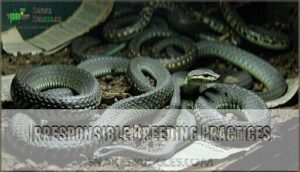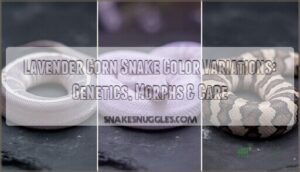This site is supported by our readers. We may earn a commission, at no cost to you, if you purchase through links.

Start by checking for licensed, reputable breeders who specialize in captive-bred snakes—local options or trusted sites like MorphMarket are great places to look.
A high-quality breeder will provide health guarantees, proper lineage details, and advice on care.
Pay attention to their communication; a good breeder is transparent and happy to answer questions.
Avoid breeders who prioritize profits over welfare or can’t provide detailed health information.
A little research upfront can mean a healthier, happier snake—after all, it’s about finding a lifelong slithery companion!
Table Of Contents
- Key Takeaways
- Choosing a Reputable Breeder
- What to Expect From a Good Breeder
- Red Flags to Watch Out For
- Factors Affecting Price and Quality
- Building a Relationship With Your Breeder
- Frequently Asked Questions (FAQs)
- Should I breed my corn snake?
- Is a corn snake a carnivore?
- Do corn snakes have a breeding season?
- What is the biggest trouble with corn snakes?
- What month do corn snakes breed?
- What is the rarest corn snake color?
- What is the most popular corn snake?
- What is the best house for a corn snake?
- What is the biggest trouble with corn snakes as pets?
- How do I verify a breeders credentials?
- Conclusion
Key Takeaways
- Always verify a breeder’s credentials, licenses, and health guarantees to ensure the snake’s well-being and ethical breeding practices.
- Ask for detailed information about the snake’s lineage, health records, and care routines, and ensure open communication from the breeder.
- Watch for red flags like lack of transparency, poor husbandry, excessive inbreeding, or breeders prioritizing profit over animal welfare.
- Prioritize breeders who offer ongoing support, clear communication, and proper education about care routines, ethical breeding, and habitat maintenance.
Choosing a Reputable Breeder
You’ll need to verify a breeder’s credentials and reputation before bringing your corn snake home, just as you wouldn’t buy a car without checking its history.
Just like you’d research a car’s history, always verify a breeder’s credentials before welcoming a corn snake into your life.
A trustworthy breeder will readily provide information about their snake’s lineage, health records, and care practices, while also maintaining open communication to support you throughout your ownership journey.
Checking for Licenses and Permits
While establishing a breeder’s reputation is vital, verifying their licenses and permits is equally important to guarantee regulation compliance.
A reputable snake breeder will readily provide documentation demonstrating their adherence to breeding laws.
Here’s what to check:
- Ask for their specific reptile breeder license number and verify it with your state’s department of agriculture
- Confirm they’ve proper exotic animal permits if required in your locality
- Inquire about their understanding of legal ramifications should they operate without proper authorization
Asking for Lineage Information and Health Guarantees
After checking licenses, explore asking about genetic background and health guarantees.
These essential conversations reveal potential health issues and confirm morph authenticity.
When speaking with a reputable breeder, request detailed lineage information to understand your future pet’s ancestry.
Ask specifically about:
Pedigree Verification
Health Guarantees
Live Arrival Guarantee
Don’t hesitate to request health documentation and information about health testing protocols.
Ethical breeding practices prioritize genetic diversity, so if a breeder seems hesitant to share this information, consider it a red flag.
Evaluating Communication and Customer Support
With lineage information in hand, it’s time to assess how the breeder interacts with you. Great communication often reflects excellent customer support.
When evaluating breeder responsiveness, consider these key factors:
- Response time: Quality breeders typically reply within 24-48 hours
- Thoroughness: They answer all questions about health guarantees without hesitation
- Shipping policies: Clear explanation of safe transport methods and live arrival guarantees
- Post-sale support: Willingness to provide ongoing care advice
Customer feedback from previous buyers can reveal volumes about a breeder’s ethical practices and commitment to open communication.
What to Expect From a Good Breeder
You’ll know you’ve found a quality corn snake breeder when they openly share health records, genetic lineage, and care information without hesitation.
A trusted corn snake breeder shares detailed health records, lineage, and care tips openly, ensuring your pet’s long-term health and happiness.
A reputable breeder will also offer ongoing support after your purchase, answering questions about feeding, handling, and habitat maintenance to guarantee your scaly friend thrives in its new home, providing care information.
Health and Genetic Diversity
Now that you’ve verified your breeder’s credentials, it’s time to examine their approach to genetic health.
Reputable breeders prioritize genetic diversity to minimize inbreeding risks and genetic defects.
They’ll openly discuss their breeding stock, health testing protocols, and lineage verification methods.
When you inquire about morph authenticity, they should provide detailed health guarantees and breeding histories.
This careful genetic stewardship guarantees you’ll receive a corn snake with the best chance for a long, healthy life.
Proper Husbandry and Care
Beyond genetics, a reputable corn snake breeder demonstrates excellence through their husbandry practices. When visiting a snake breeder, pay close attention to how they maintain their animals.
Quality breeders showcase:
- Appropriate enclosure size with proper temperature gradients (85°F warm side, 75°F cool side)
- Clean substrate choices like aspen or coconut fiber, changed regularly
- Consistent feeding schedule documented for each snake
- Proactive monitoring for common shedding issues
Watch how they handle their corn snakes—gentle, confident movements indicate animals that are properly socialized. The best reptile breeders maintain detailed records of each snake’s eating patterns and growth. Recognizing and addressing signs of poor husbandry is also essential for a snake’s well-being. This attention to corn snake care fundamentals reveals their commitment to animal welfare, not just profits.
Education and Support for New Owners
Exceptional education sets reputable corn snake breeders apart from the rest.
They equip you with essential knowledge for successful ownership.
- Handling techniques that build confidence for both you and your scaly friend
- Nutrition guidance customized to your snake’s specific needs and life stage
- Habitat maintenance tips to create the perfect environment
- Ongoing support through your snake care journey, from hatchling to adult
These educational resources are invaluable for snake beginners adjusting to their new pet.
You can find essential corn snake supplies at many online retailers, which provides ongoing support and helps with habitat maintenance.
Transparency and Accountability
A reputable breeder values transparency like a trusted friend who never hides the truth.
You’ll witness their commitment through detailed breeding records and honest health disclosures about their corn snakes.
| Accountability Sign | What It Tells You |
|---|---|
| Online reviews | Consistent positive feedback |
| Health documentation | Commitment to snake welfare |
| Breeding records | Ethical breeding practices |
| Open communication | Willingness to answer questions |
Look for breeders who readily share information about genetic history and husbandry practices, demonstrating responsible practices and genuine care for their animals.
Their transparency isn’t just about building customer trust—it demonstrates a commitment to the welfare of the animals, and remember, secretive breeders often have something to hide, which can be a sign of unethical breeding.
Red Flags to Watch Out For
You’ll need to recognize warning signs when searching for a corn snake breeder, as not all sellers prioritize animal welfare over profit.
Spotting these red flags early can save you from heartache and vet bills, ensuring your new scaly friend comes from ethical breeding practices.
Irresponsible Breeding Practices
While good breeders prioritize snake health, it’s vital to recognize the dark side of the industry. Irresponsible breeding practices can harm corn snakes for generations.
Watch for these red flags:
- Excessive inbreeding leading to harmful genetic mutations
- Overbreeding females to maximize profit at their health’s expense
- Creating unethical morphs with known quality-of-life issues
- Neglectful care conditions like overcrowded enclosures
Profit-driven breeders often sacrifice animal welfare for quick sales.
In some cases, this can lead to heightened inbreeding concerns.
When a breeder can’t answer specific questions about their breeding program, that’s your cue to walk away.
Lack of Transparency and Communication
Transparency serves as the backbone of any reputable breeder relationship.
When faced with evasive answers about feeding records or delayed responses to your questions, consider it a major warning sign.
Hidden information about lineage, incomplete records, or unanswered questions about health guarantees should prompt you to look elsewhere.
Check their online presence and reviews—trustworthy breeders maintain transparent communication throughout the entire process, not just until payment clears.
Transparency also includes breeders openly discussing their methods of ball python breeding.
This openness is crucial for building a strong and transparent relationship between the breeder and the buyer.
Poor Health and Genetics
Behind beautiful scales often lurk hidden health problems when breeders cut corners.
Watch for these genetic red flags:
- No health screening documentation for common corn snake genetic defects
- Vague answers about inbreeding risks or morph-related issues
- Refusal to provide lineage tracing for multiple generations
- Absence of a written health guarantee covering genetic issues
Don’t gamble with snake health—reputable breeders prioritize genetics over aesthetics.
Prioritize your snake’s health by ensuring proper snake product selection, and remember to avoid risks associated with neglecting genetic issues.
Overemphasis on Profit Over Animal Welfare
How can you spot breeders who prioritize profit over animal welfare?
Watch for snake mill dangers where profit-driven breeders crowd animals into tiny enclosures or offer suspiciously low prices.
Ethical breeding costs more because it values snake health.
Be wary of exploitation of morphs without concern for genetic health, conservation negligence, and inhumane shipping practices.
Remember, a responsible breeder’s setup reflects their commitment to breeder ethics, not just their bottom line.
Factors Affecting Price and Quality
You’ll find that the price and quality of corn snakes vary based on factors like age, sex, morph rarity, and breeder reputation.
Understanding these elements will help you make an informed purchase decision, ensuring you don’t end up with an overpriced snake that doesn’t meet your expectations.
Age, Sex, and Color Morph
After spotting red flags, let’s examine what impacts your corn snake’s price tag.
When selecting your perfect scaly companion, age, sex, and color morph substantially influence cost.
Here’s what affects pricing:
- Age determination – Young snakes cost less but undergo color development as they grow
- Sexing methods – Females typically command higher prices than males
- Morph identification – Rare genetic variations like albino or lavender increase value
- Color inheritance – Unique patterns and mutations can dramatically affect pricing
Growth rate varies between morphs, so research thoroughly before purchase.
Rarity and Demand
Popular morphs like blue or candy cane corn snakes stand out for their rarity and limited availability, which drives up prices.
Morph popularity and future trends often increase demand, especially during breeding season.
Market fluctuations affect morph price variance, so keep an eye on desired traits matching seasonal demand.
Rare morphs typically cost more but offer unique appeal.
Breeder Reputation and Experience
A breeder’s reputation and experience shape your journey to finding a healthy, happy corn snake. Trust those embracing ethical breeding practices, strong customer relations, and community engagement.
- Check online reviews for honest feedback.
- Ensure breeder transparency in communication and care practices.
- Look for ethical practices, prioritizing snake welfare over profit.
- Evaluate online presence, showcasing credibility and expertise.
Good breeders offer guidance, making your scaly friend feel like family! They should also demonstrate rigorous quarantine protocols to prevent the spread of disease.
Health Guarantees and Returns
When buying a corn snake, the breeder’s return policy can make or break your peace of mind.
Look for clear terms on refund processes, including who covers return shipping costs. A trustworthy breeder offers health guarantees—these often include coverage for genetic defects and detailed vet records.
While checking the guarantee length, remember it shows their confidence in the snake’s health. Be sure to review live arrival terms, ensuring the snake reaches you safely.
If issues arise, the guarantee claim process should feel simple, not a scavenger hunt. Finally, a good breeder makes certain post-sale support, giving you ongoing advice to help your new scaly friend thrive stress-free!
Building a Relationship With Your Breeder
Building a good relationship with your breeder helps guarantee you’re getting a healthy snake and dependable support.
Clear communication and trust make it easier to ask questions and feel confident about your decision.
Establishing Trust and Communication
Establishing open communication with a reputable breeder helps you feel confident about your new scaly friend. Look for responsiveness and candid, ethical disclosures. Building rapport lays the foundation for trust and keeps you informed about care practices.
Here’s how to assess communication quality:
- Ask about their customer feedback and references openly.
- Discuss health guarantees, including food like frozen-thawed mice.
- Confirm support availability, such as post-purchase guidance.
- Inquire how they guarantee ethical breeding.
- Gauge their passion for snakes by their responsiveness.
To guarantee transparency, breeders should offer detailed breeding history.
Visiting The Breeder in Person
Schedule an in-person visit to the breeder’s facility. Check for spotless enclosures and note the overall facility cleanliness—it shows their commitment.
Observe how the snakes are housed; are the terrariums spacious and secure? Watch for a calm snake temperament, a sign of proper care.
Ask prepared questions about their breeding ethics while handling the snakes. Open communication with the breeder builds trust and guarantees a smooth purchase experience.
Ongoing Support and Education
Connecting with your breeder offers more than just a purchase—it’s a partnership. They’ll guide you with care guidance, handling techniques, and nutrition advice, guaranteeing your scaly friend thrives.
Whether it’s habitat maintenance tips or snake customer guidance, their ongoing support is invaluable.
Post-sale support often includes education on health or behavior quirks. A solid breeder relationship guarantees you’re never alone in mastering snake care education for your new pet, providing ongoing support.
Frequently Asked Questions (FAQs)
Should I breed my corn snake?
Breeding your corn snake depends on your experience, resources, and commitment.
It requires understanding genetics, proper housing, and care for hatchlings.
If unsure, seek guidance from reputable breeders to avoid potential challenges or ethical concerns.
Is a corn snake a carnivore?
Curious critters, corn snakes are carnivores, thriving on a diet of meaty morsels like mice and birds.
They’re expert hunters in the wild, but in captivity, frozen-thawed rodents keep them happy and healthy.
Do corn snakes have a breeding season?
Yes, corn snakes have a breeding season, typically in late winter to early spring.
They naturally breed after brumation, a cooler rest period, which mimics their natural cycle and encourages reproductive behavior in captivity, especially after a period that encourages reproductive behavior.
What is the biggest trouble with corn snakes?
Nearly 40% of pet snake owners report improper enclosures as a major issue.
For corn snakes, a habitat that’s too small, poorly heated, or lacks hiding spots can stress them out, affecting their health and appetite.
What month do corn snakes breed?
Corn snakes typically breed in spring, around March to May, when warmer temperatures signal the start of mating season.
Males show increased activity, and females prepare for laying eggs after successful mating.
What is the rarest corn snake color?
Imagine a painter’s rarest masterpiece—the Palmetto corn snake mirrors that vision.
Its white body speckled with vibrant, random colors makes it one of the rarest and most sought-after morphs among snake enthusiasts.
What is the most popular corn snake?
The classic orange and red "Okeetee" morph is a fan favorite among corn snake enthusiasts.
Its vibrant colors and bold patterns make it visually striking, easy to care for, and perfect for both beginners and experts.
What is the best house for a corn snake?
Think of a secure glass terrarium, like a cozy apartment for your corn snake.
Aim for at least 20 gallons, plenty of hides, climbing branches, and consistent temps (75-85°F).
They’ll love it, with plenty of hides and other features that make their home comfortable.
What is the biggest trouble with corn snakes as pets?
The biggest challenge with corn snakes is handling escapes—they’re skilled at squeezing through tiny gaps.
You’ll need a secure enclosure, regular checks, and quick reflexes if they find a way out!
How do I verify a breeders credentials?
To verify a breeder’s credentials, check for a license or permit, confirm compliance with local laws, and read reviews.
Ask detailed questions about their practices, health guarantees, and lineage transparency to confirm reliability.
Conclusion
It’s ironic how finding the best corn snake breeder feels more like researching a university than picking a pet.
But by focusing on licensed, reputable breeders who prioritize health and care over profits, you’ll guarantee your snake gets the best start.
Check for health guarantees, clear lineage details, and responsive communication.
Trustworthy breeders are an ally for you and your lifelong scaly companion, and by doing the work now, you’ll thank yourself—and your snake—later, which is a lifelong benefit.

















